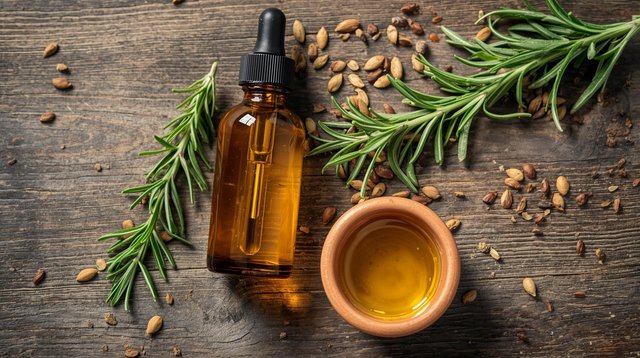Scalp Health and Hair Growth: The Role of Rosemary and Pumpkin Seed Oil
Healthy hair depends on scalp condition. Follicles grow best when the scalp is clean, balanced, and nourished. Problems such as buildup, dryness, or inflammation interfere with the cycle of growth and shedding. Many people focus on shampoos and styling products, but the scalp itself needs attention. Natural oils provide one way to do this. Rosemary and pumpkin seed oil are among the most studied options for supporting scalp health.
For an overview of how rosemary oil works in natural blends, see this resource: https://melitaorganics.com/products/ready-rosemary
Why Scalp Condition Shapes Hair Growth
Every hair follicle passes through growth, rest, and shedding. Disruption shortens the growth stage and weakens strands. Issues include:
Sebum buildup that clogs follicles
Poor circulation that limits nutrients
Inflammation that damages tissue
Microbial imbalance that irritates the scalp
Research confirms that chronic scalp irritation reduces density. Supporting scalp health helps follicles stay active.
Nutrients Needed for Follicles
The scalp depends on nutrients to maintain normal function. When shortages occur, hair growth slows. Important nutrients include:
Zinc for oil balance and repair
Vitamin E for antioxidant protection
Omega fatty acids for inflammation control
Biotin for keratin production
Magnesium for protein synthesis
Food provides most of this, but topical delivery through oils gives direct support at the scalp.
Why Plant Oils Work
Plant oils carry fatty acids, antioxidants, and micronutrients. Applied to the scalp, they:
Replenish skin lipids
Reduce dryness
Keep follicles flexible
Deliver active compounds to tissue
Unlike synthetic conditioners, natural oils interact directly with scalp skin.
Rosemary Oil and Hair Growth
Rosemary oil has been used in care routines for centuries. Modern studies support its role. A 2015 trial compared rosemary oil with 2 percent minoxidil. After six months, both groups improved hair count.
Rosemary oil helps by:
Improving scalp circulation
Calming inflammation
Balancing microbial activity
This creates a healthier environment for follicles.
Pumpkin Seed Oil and Hair Growth
Pumpkin seed oil is rich in linoleic acid, oleic acid, and phytosterols. A 2014 randomized trial showed men taking pumpkin seed oil supplements had a 40 percent increase in hair count after 24 weeks compared with placebo.
Applied topically, pumpkin seed oil delivers vitamin E, carotenoids, and fatty acids. Its phytosterols interact with enzymes linked to hair cycle regulation.
Combining Rosemary and Pumpkin Seed Oil
Each oil provides unique support. Rosemary oil improves circulation and balances microbes. Pumpkin seed oil delivers nutrients and phytosterols. Used together, rosemary and pumpkin seed oil for hair growth address several challenges at once. This combination nourishes the scalp, supports blood flow, and encourages consistent growth cycles.
Practical Routine for Scalp Care
Wash with a mild shampoo two or three times weekly.
Exfoliate with a brush or scrub once weekly.
Apply a few drops of rosemary and pumpkin seed oil blend two or three times weekly.
Massage for several minutes to improve circulation.
Leave for at least 30 minutes or overnight before rinsing.
Massage is important. A 2016 study found daily scalp massage improved hair thickness after 24 weeks.
Addressing Common Questions
Will oil leave hair greasy?
Apply a few drops directly to the scalp. If needed, wash the next morning.
How long before results?
Hair grows about half an inch each month. Consistency for three to six months is needed before visible change.
Can oils be used with other treatments?
Yes, but patch test first to avoid irritation.
Lifestyle Habits That Support Hair
Topical care works best when combined with daily habits:
Manage stress, since cortisol shortens growth cycles
Sleep enough to support repair
Avoid smoking, which restricts circulation
Protect scalp skin from strong sun exposure
These steps strengthen the effect of oils.
Ingredients to Avoid
Products with harsh additives harm the scalp. Common examples include:
Sulfates that strip oil
Parabens that disrupt balance
Heavy silicones that clog follicles
Strong alcohols that dry skin
Choosing natural formulations lowers irritation risk.
Scientific Support for Natural Oils
Conventional treatments remain common, but side effects are a concern. Natural oils offer a lower-risk option with growing evidence. The rosemary trial shows measurable results. The pumpkin seed oil study adds further support. Together they represent a practical, evidence-based approach.
Selecting Quality Oils
Look for:
Cold-pressed pumpkin seed oil
Steam-distilled rosemary oil
Dark glass packaging
Ingredient lists without fillers
Transparent sourcing increases trust. For a rosemary-based formulation designed for scalp care, see this page: https://melitaorganics.com/products/ready-rosemary
Different Hair Types
Straight hair benefits from frequent cleansing and light oil massage
Wavy hair responds well to small amounts of oil weekly
Curly hair gains softness from pre-wash oil treatments
Coily hair requires regular hydration through oil massage
The Scalp Microbiome
The scalp contains a mix of bacteria and fungi. A balanced microbiome protects against dandruff and irritation. Rosemary oil helps regulate microbes, while pumpkin seed oil supports the skin barrier. This combination reduces stress on follicles.
Setting Realistic Expectations
Results take time. Hair grows slowly, so patience and consistent routines are essential. Oils strengthen follicles and support cycles, but progress requires months of regular use.
Tips for Application
Warm a few drops in your hands
Apply to clean scalp skin
Massage for several minutes
Leave for at least 30 minutes
Apply overnight for deeper conditioning once or twice weekly
Final Thoughts
Hair growth starts at the scalp. Evidence supports rosemary oil for circulation and pumpkin seed oil for nutrient delivery. Using rosemary and pumpkin seed oil for hair growth provides a simple way to support scalp health.
For readers interested in natural blends featuring rosemary oil, see this resource: https://melitaorganics.com/products/ready-rosemary

